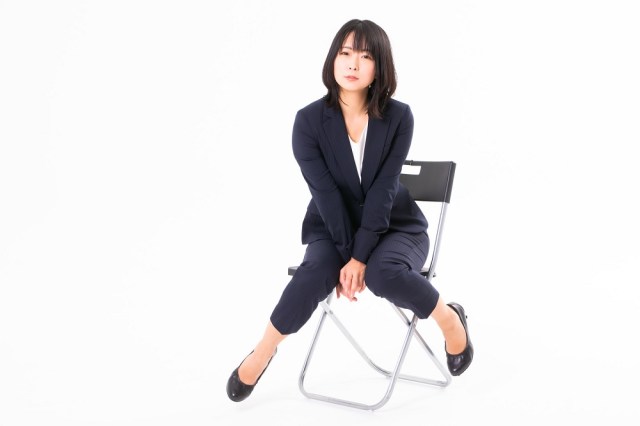
How do scam artists keep getting caught in Japan by “not looking good in a suit?”
“Taxi driver” is one of those jobs that can involve a broad range of activities. Obviously driving the taxi is the main one, but they might also find themselves filling the role of travel guide if an out-of-town tourist has some questions about the community, or even just lending a friendly or sympathetic ear when a passenger is feeling chatty.
And then there’s the driver of a cab in Hyogo Prefecture, who suddenly became a crime fighter this week. On Tuesday morning, the driver picked up a passenger in the town of Ako, a 27-year-old woman with brown hair wearing a suit. She asked him to take her to a private residence elsewhere in the city, and he did. After he dropped her off, though, instead of going cruising for his next fare, the taxi driver called the police and told them “I gave a ride to a young woman with brown hair, but she didn’t look right in the suit. I think she might be involved in some kind of scam.”
▼ Yes, he literally called the fashion police on her.
The jump from “wearing a suit” to “pulling a scam” might seem strange, but the most common frauds in Japan involve criminals posing as respectable businesspeople to cheat gullible or confused senior citizens out of their money, and so the police decided to look into the matter. Before an officer could arrive on scene the young woman had already left in a different cab, but investigators were able to contact the second driver and find out where he’d taken her. From there, it was only a short time until they located the woman, having changed into a different outfit but with the suit she’d been wearing during the cab ride still in her possession. Also in her possession: the ATM card of an 88-year-old woman who lives in the home the first cab driver had taken her to.
Upon questioning, the younger woman admitted that she’d called the older woman on the phone earlier that morning, telling her a made-up story about a medical care insurance refund that she was eligible for. Posing as an intermediary agent handling the transaction, she convinced the elderly woman to give her her ATM card and tell her the PIN, ostensibly with the lie that she needed them to transfer the refund into the victim’s bank account.
Luckily, the police were able to take the woman into custody before she could withdraw funds with the ill-gotten card and PIN. She’s now been arrested for attempted fraud and has admitted to the charges, though investigators believe she is likely a runner for a larger operation.
Getting back to the fashion-critiquing cabbie who called the police, this isn’t the first, or even the second, time a crime in Japan has been prevented because someone didn’t look good in a suit. Strange as it may seem, there’s actually some plausible logic behind the deductions. If a suit doesn’t look right on someone, that generally means they don’t look comfortable in it. Maybe it’s ill-fitting, or maybe they’re unusually fidgety and tugging at the shoulder or sleeves. But in general, white-collar wear-a-suit jobs in Japan require you to wear one every day, so most people actually working in such professions get used to them pretty quickly.
But what about younger workers who haven’t been in their position very long? Don’t they still feel, and look, kind of awkward wearing a suit? Maybe, but that’s where the importance Japanese work culture places on experience, and senpai/kohai (senior/junior) relationships come into play. If an employee is still inexperienced enough that they’re not used to wearing a suit (i.e. they don’t look comfortable/”right” in one), it’s unlikely that they’re getting sent out to visit clients in their homes, at least not by themselves. If they are making house calls, they’re probably tagging along with a more experienced coworker for a watch-and-learn experience, not handling customer interactions solo.
So odds are when these criminals are getting caught for not looking good in a suit, it’s not because the people reporting them don’t like the fabric or number of buttons, but because they’re dressed like businesspeople without seeming used to an intrinsic part of Japanese business, tipping careful observers off that they might be posing as someone they’re not, and also up to no good.
Source: Kobe Shimbun Next via Hachima Kiko
Top image: Pakutaso
Insert images: Pakutaso (1, 2)
● Want to hear about SoraNews24’s latest articles as soon as they’re published? Follow us on Facebook and Twitter!



 Japanese police question man for “not looking good in a suit,” turns out he robbed an old lady
Japanese police question man for “not looking good in a suit,” turns out he robbed an old lady Woman asks for eight-hour taxi ride in Japan, arrested when she doesn’t pay gigantic fare
Woman asks for eight-hour taxi ride in Japan, arrested when she doesn’t pay gigantic fare “The streets belong to the humans” asserts Tokyo taxi driver after arrest for running over pigeon
“The streets belong to the humans” asserts Tokyo taxi driver after arrest for running over pigeon Foreigner convenience store clerk in Japan saves elderly woman from scammers with quick thinking
Foreigner convenience store clerk in Japan saves elderly woman from scammers with quick thinking Thinking she was giving money to Mick Jagger to invest for her, woman conned in Aomori
Thinking she was giving money to Mick Jagger to invest for her, woman conned in Aomori Potama serves up epic rice balls like no other, and there’s only one store in Tokyo
Potama serves up epic rice balls like no other, and there’s only one store in Tokyo Japan’s craziest burger chain takes menchi katsu to new extreme levels
Japan’s craziest burger chain takes menchi katsu to new extreme levels Starbucks Japan releases first-ever Hinamatsuri Girls’ Day Frappuccino
Starbucks Japan releases first-ever Hinamatsuri Girls’ Day Frappuccino Which convenience store onigiri rice balls are the most popular? Survey reveals surprising results
Which convenience store onigiri rice balls are the most popular? Survey reveals surprising results Drift ice in Japan is a disappearing winter miracle you need to see now
Drift ice in Japan is a disappearing winter miracle you need to see now Can you eat lunch in Tokyo for less than 500 yen?
Can you eat lunch in Tokyo for less than 500 yen? Majority of Japanese women in survey regret marrying their husband, but that’s only half the story
Majority of Japanese women in survey regret marrying their husband, but that’s only half the story We visit the 24-hour male-only sauna just outside of Hakata Station and ponder a strange sight
We visit the 24-hour male-only sauna just outside of Hakata Station and ponder a strange sight “Bumping men” are a uniquely Japanese class of criminals that are hard to deal with
“Bumping men” are a uniquely Japanese class of criminals that are hard to deal with Extreme budget travel! Can you do a good weekend trip to Taiwan with 50,000 yen (US$370)? – Part 1
Extreme budget travel! Can you do a good weekend trip to Taiwan with 50,000 yen (US$370)? – Part 1 Japanese restaurant chain serves Dragon Ball donuts and Senzu Beans this spring
Japanese restaurant chain serves Dragon Ball donuts and Senzu Beans this spring Highest Starbucks in Japan set to open this spring in the Tokyo sky
Highest Starbucks in Japan set to open this spring in the Tokyo sky Tokyo Skytree turns pink for the cherry blossom season
Tokyo Skytree turns pink for the cherry blossom season Japan Extreme Budget Travel! A trip from Tokyo to Izumo for just 30,000 yen [Part 1]
Japan Extreme Budget Travel! A trip from Tokyo to Izumo for just 30,000 yen [Part 1] Yakuzen ramen restaurant in Tokyo is very different to a yakuza ramen restaurant
Yakuzen ramen restaurant in Tokyo is very different to a yakuza ramen restaurant Japan has only one airport named after a samurai, so let’s check out Kochi Ryoma【Photos】
Japan has only one airport named after a samurai, so let’s check out Kochi Ryoma【Photos】 Japanese drugstore sells onigiri at pre-stupid era prices, but how do they compare to 7-Eleven?
Japanese drugstore sells onigiri at pre-stupid era prices, but how do they compare to 7-Eleven? Japan Extreme Budget Travel! A trip from Tokyo to Izumo for just 30,000 yen [Part 2]
Japan Extreme Budget Travel! A trip from Tokyo to Izumo for just 30,000 yen [Part 2] Adorable Totoro acorn key holders come with a special guest hidden inside[Photos]
Adorable Totoro acorn key holders come with a special guest hidden inside[Photos] Japan’s newest Shinkansen has no seats…or passengers [Video]
Japan’s newest Shinkansen has no seats…or passengers [Video] Starbucks Japan releases new sakura goods and drinkware for cherry blossom season 2026
Starbucks Japan releases new sakura goods and drinkware for cherry blossom season 2026 Foreigners accounting for over 80 percent of off-course skiers needing rescue in Japan’s Hokkaido
Foreigners accounting for over 80 percent of off-course skiers needing rescue in Japan’s Hokkaido Super-salty pizza sends six kids to the hospital in Japan, linguistics blamed
Super-salty pizza sends six kids to the hospital in Japan, linguistics blamed Starbucks Japan unveils new sakura Frappuccino for cherry blossom season 2026
Starbucks Japan unveils new sakura Frappuccino for cherry blossom season 2026 Foreign tourists in Japan will get free Shinkansen tickets to promote regional tourism
Foreign tourists in Japan will get free Shinkansen tickets to promote regional tourism The 10 most annoying things foreign tourists do on Japanese trains, according to locals
The 10 most annoying things foreign tourists do on Japanese trains, according to locals Take a trip to Japan’s Dododo Land, the most irritating place on Earth
Take a trip to Japan’s Dododo Land, the most irritating place on Earth Naruto and Converse team up for new line of shinobi sneakers[Photos]
Naruto and Converse team up for new line of shinobi sneakers[Photos] Is China’s don’t-go-to-Japan warning affecting the lines at a popular Tokyo gyukatsu restaurant?
Is China’s don’t-go-to-Japan warning affecting the lines at a popular Tokyo gyukatsu restaurant? Survey asks foreign tourists what bothered them in Japan, more than half gave same answer
Survey asks foreign tourists what bothered them in Japan, more than half gave same answer Japan’s human washing machines will go on sale to general public, demos to be held in Tokyo
Japan’s human washing machines will go on sale to general public, demos to be held in Tokyo Starbucks Japan releases new drinkware and goods for Valentine’s Day
Starbucks Japan releases new drinkware and goods for Valentine’s Day We deeply regret going into this tunnel on our walk in the mountains of Japan
We deeply regret going into this tunnel on our walk in the mountains of Japan Studio Ghibli releases Kodama forest spirits from Princess Mononoke to light up your home
Studio Ghibli releases Kodama forest spirits from Princess Mononoke to light up your home Major Japanese hotel chain says reservations via overseas booking sites may not be valid
Major Japanese hotel chain says reservations via overseas booking sites may not be valid Put sesame oil in your coffee? Japanese maker says it’s the best way to start your day【Taste test】
Put sesame oil in your coffee? Japanese maker says it’s the best way to start your day【Taste test】 No more using real katana for tourism activities, Japan’s National Police Agency says
No more using real katana for tourism activities, Japan’s National Police Agency says Video shows what may be Japan’s most artless scam artist launch herself into a stopped car【Video】
Video shows what may be Japan’s most artless scam artist launch herself into a stopped car【Video】 Real fashion police: Con man arrested in Tokyo, police tipped off by ill-fitting suit
Real fashion police: Con man arrested in Tokyo, police tipped off by ill-fitting suit Foreign-born convenience store manager in Japan saves elderly customer from being scammed
Foreign-born convenience store manager in Japan saves elderly customer from being scammed Ibaraki Police warn against fake warnings by the police
Ibaraki Police warn against fake warnings by the police 15-year-old girl tries to scam adult out of $40,000 – gets caught dressed like a businessman
15-year-old girl tries to scam adult out of $40,000 – gets caught dressed like a businessman Woman says she’s a foreign student struggling in the pandemic, asks us to buy her homemade chocolate
Woman says she’s a foreign student struggling in the pandemic, asks us to buy her homemade chocolate Mysterious Japanese woman gives one million yen in cash to man she’s never met, then disappears
Mysterious Japanese woman gives one million yen in cash to man she’s never met, then disappears Naked woman runs through one of Tokyo’s busiest train stations, police say she’s not a criminal
Naked woman runs through one of Tokyo’s busiest train stations, police say she’s not a criminal Old Japanese woman gives over 80 million yen to scam artist in new case of Japan’s oldest scam
Old Japanese woman gives over 80 million yen to scam artist in new case of Japan’s oldest scam Police in Japan arrest woman on suspicion of literal ass-kicking
Police in Japan arrest woman on suspicion of literal ass-kicking Japanese teen calls cops on man she thinks is holding a knife, turns out he just has old tech
Japanese teen calls cops on man she thinks is holding a knife, turns out he just has old tech Osaka man arrested for trying to rob woman with necktie that says “Police”
Osaka man arrested for trying to rob woman with necktie that says “Police” Man in Japan arrested after sneaking into woman’s apartment and washing her lingerie
Man in Japan arrested after sneaking into woman’s apartment and washing her lingerie Family cheated out of 54 million yen by man impersonating Japanese rock star for three years
Family cheated out of 54 million yen by man impersonating Japanese rock star for three years Kamen Rider, one of Japan’s greatest heroes, arrested for groping woman’s breasts in Tokyo suburb
Kamen Rider, one of Japan’s greatest heroes, arrested for groping woman’s breasts in Tokyo suburb